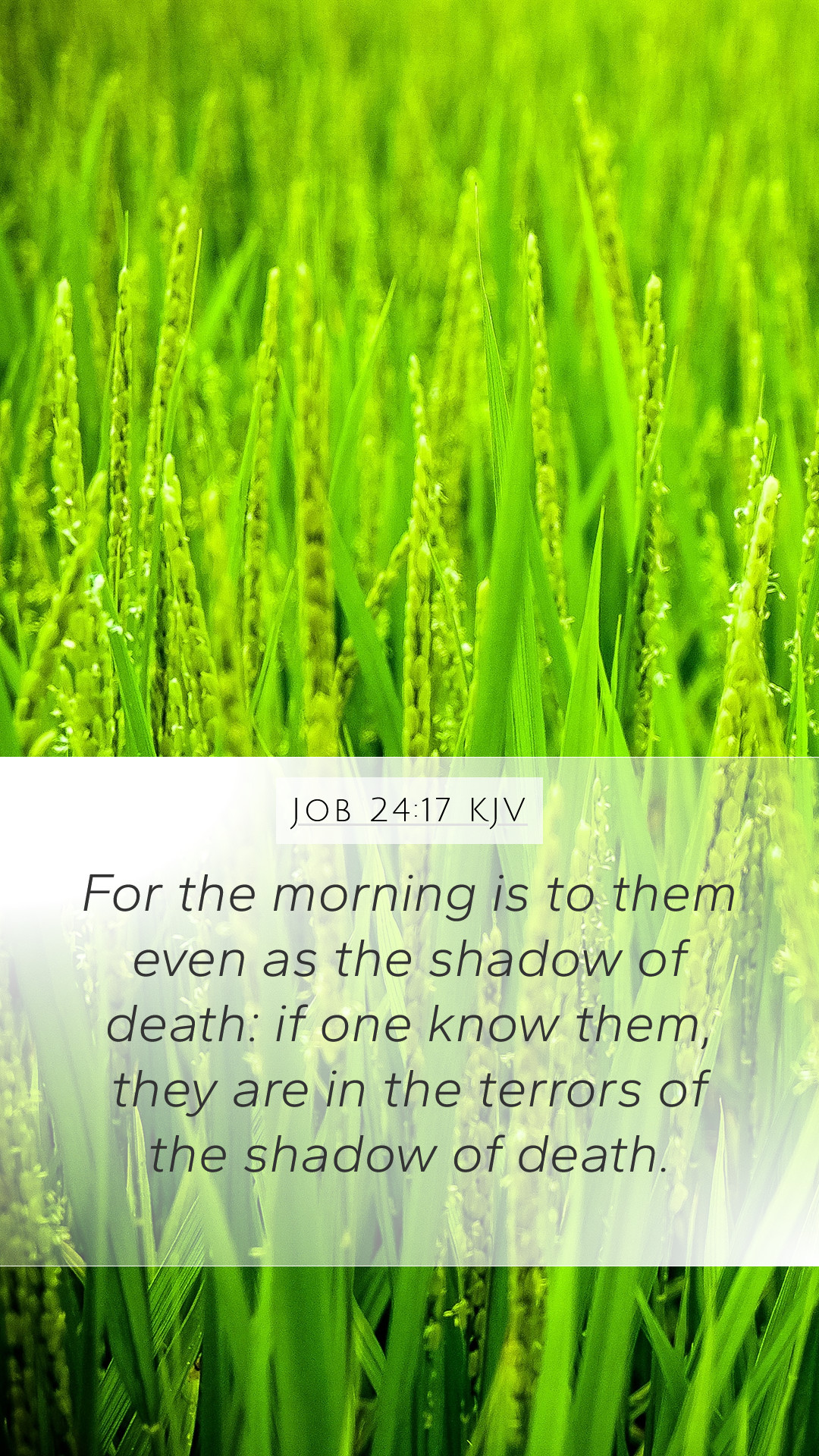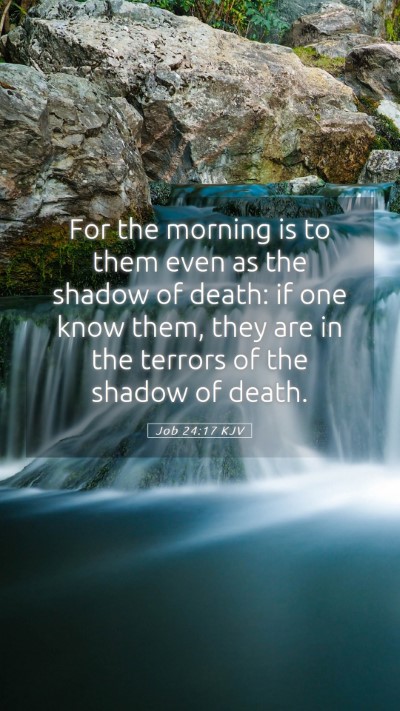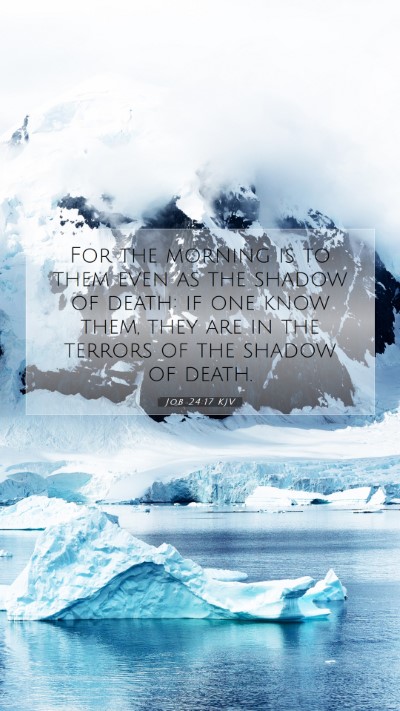Old Testament
Genesis Exodus Leviticus Numbers Deuteronomy Joshua Judges Ruth 1 Samuel 2 Samuel 1 Kings 2 Kings 1 Chronicles 2 Chronicles Ezra Nehemiah Esther Job Psalms Proverbs Ecclesiastes Song of Solomon Isaiah Jeremiah Lamentations Ezekiel Daniel Hosea Joel Amos Obadiah Jonah Micah Nahum Habakkuk Zephaniah Haggai Zechariah MalachiJob 24:17 Meaning
What is the meaning of Job 24:17?
For the morning is to them even as the shadow of death: if one know them, they are in the terrors of the shadow of death.
Job 24:17 Bible Verse Meaning
Understanding Job 24:17
Job 24:17 states: "For the morning is to all of them as the shadow of death: if one know them, they are in the terrors of the shadow of death." This verse falls within a larger discourse by Job, where he laments the seeming prosperity of the wicked and the suffering of the righteous. This commentary will draw from various public domain sources to provide a comprehensive understanding of this verse.
Bible Verse Meanings
This passage highlights the grim reality faced by individuals who are entrenched in sin and the moral dilemmas of those who seek to uphold righteousness. The 'morning' signifies hope or new beginnings, yet for these individuals, it acts more like a 'shadow of death.' Matthew Henry emphasizes that the 'morning' is filled with impending dangers and the certainty of despair for the wicked.
Bible Verse Interpretations
According to Albert Barnes, this verse contrasts the light of day with the dread that envelops the wicked. The interpretation outlines how, even with the passing of night to day, the heart of the unrighteous remains in darkness; they are unable to experience true joy or hope, remaining haunted by their sinful deeds.
Bible Verse Understanding
Adam Clarke further reflects on the phrase 'shadow of death,' indicating that fear grips those who live outside of God's goodness. This shadow symbolizes uncertainty and imminent destruction. Hence, while day breaks for the righteous with joy, it is merely a grim reminder of judgment for the wicked.
Bible Verse Explanations
This verse serves as a sobering reminder that despite external appearances, the state of one's soul can profoundly affect their perception and experience of life. The shadows of guilt and darkness hover over the wicked, making every new day a continuation of torment rather than relief.
Key Themes
- Despair of the Wicked: The implications of living a life apart from God lead to a persistent state of fear and hopelessness.
- Contrast of Light and Darkness: The imagery of morning versus the shadows highlights the stark differences between the righteous and the unrighteous.
- The Nature of Judgment: Job's lamentation points to the justice of God, ultimately affirming the truth that sin begets suffering.
Scripture Analysis
The analysis involves considering Job's plight as he questions the justice of God in allowing the wicked to prosper. Job acknowledges the emotional turmoil that those who live unrighteously endure:
- Job 3:5: "Let darkness and the shadow of death stain it; let a cloud dwell upon it; let the blackness of the day terrify it." Here Job uses similar imagery of darkness reflecting his own despair.
- Psalm 23:4: "Yea, though I walk through the valley of the shadow of death, I will fear no evil: for thou art with me." This verse provides a contrasting perspective of faith amidst darkness.
- Isaiah 59:9: "Therefore is judgment far from us, neither doth justice overtake us: we wait for light, but behold obscurity; for brightness, but we walk in darkness." This reflects the theme of longing for justice against the backdrop of prevailing darkness.
Application of Job 24:17
Understanding this verse prompts believers to reflect on their lives and the paths they choose. It encourages individuals to seek righteousness and avoid the despair associated with sin:
- Encouragement to Pursue Righteousness: The consequences of sin are dire, and one is urged to live in accordance with God's will.
- Awareness of Personal State: This verse serves as a reminder to examine one's own heart and ensure it is aligned with truth and light.
- Hope for Redemption: Despite the darker tones of the verse, it also points toward the grace available through repentance.
Bible Study Insights
Engaging with this verse in a Bible study group can drive meaningful discussions about the nature of justice, the challenges of faith, and the hope that accompanies a righteous life.
Conclusion
Job 24:17 encapsulates a profound truth about the human condition in relation to sin and righteousness. By drawing insights from public domain commentaries and examining the scriptural context, we gain a deeper understanding of the struggles faced and the light of hope that exists for the faithful.


